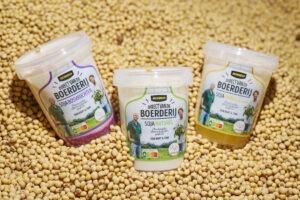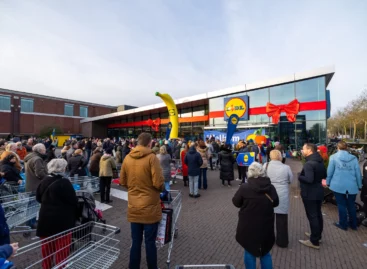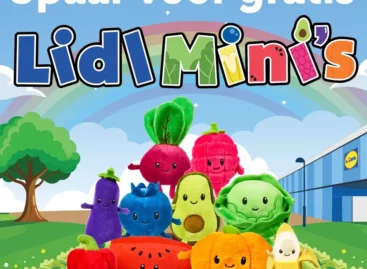Dutch Retailer Jumbo Launches Plant-Based Yoghurt From Local Soy
Dutch retailer Jumbo has launched three plant‐based yoghurt SKUs made from locally grown soybeans in more than 300 stores across the Netherlands.

The products are part of the retailer’s Direct van de Boerderij (Direct from the Farm) range, developed and produced by De Nieuwe Melkboer, the company added.
The three variants – Natural, Vanilla, and Forest Fruits – are high in protein and fibre.
The production process uses whole soybeans, which, according to Tom Grobben, co‐owner of De Nieuwe Melkboer, offer two advantages – efficient use of raw materials without residual flows and a product with enhanced fibre content.
Jumbo’s expansion into plant‐based dairy alternatives aligns with its broader sustainability ambitions, which include preventing resource waste and reducing CO2 emissions, among others.
The company sees the introduction of these yoghurt variations as a step towards encouraging consumers to adopt a plant‐based eating pattern.
The launch follows weeks after the Dutch retailer Jumbo announced that its CEO Ton van Veen has decided to step down.
Dutch Soy Cultivation Soars
Menno Wigtman, unit manager for AGF and Protein at Jumbo, noted that most of its fresh products originate from Dutch soil and highlighted the retailer’s commitment to offering products produced by local farmers.
The collaboration between Jumbo and De Nieuwe Melkboer was established through the Plant Protein Forward initiative – a partnership involving Foodvalley, Rabobank, and regional authorities.
Marjolein Brasz, CEO of Foodvalley, stated that this collaboration is based on the principles of bringing farmers and food providers together.
Soy cultivation in the Netherlands has become increasingly viable, particularly in the southern regions, due to changing climate conditions and variety selection.
The announcement coincides with Bean Meal Week, during which supermarkets and caterers promote the consumption of legumes produced in the Netherlands.
National legume sales have reportedly increased by 5.4% in 2024 compared with 2023, reflecting a growing consumer interest in locally produced, plant‐based alternatives.
Related news
Lidl Netherlands Aims For 46% Healthy Food Sales By 2030
🎧 Hallgasd a cikket: Lejátszás Szünet Folytatás Leállítás Nyelv: Auto…
Read more >Related news
MOHU: 5,200 return points are in operation, but 47 larger settlements still do not have RE points – public “enema” machines may be introduced
🎧 Hallgasd a cikket: Lejátszás Szünet Folytatás Leállítás Nyelv: Auto…
Read more >Change in Rossmann Hungary’s leadership: Kornél Németh decided to move towards new challenges in 2026
🎧 Hallgasd a cikket: Lejátszás Szünet Folytatás Leállítás Nyelv: Auto…
Read more >







